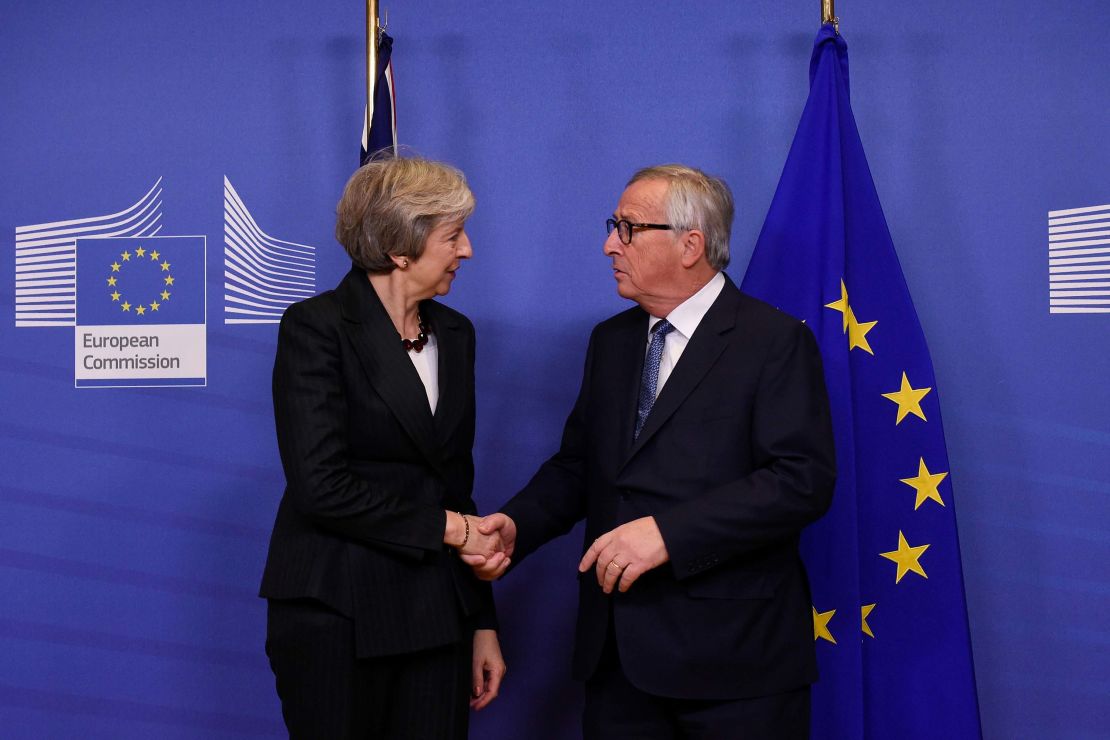A final Brexit deal is within reach, UK Prime Minister Theresa May insisted Thursday, after agreeing on a draft declaration on Britain’s future relationship with the European Union.
May told the UK Parliament that the 26-page draft political declaration – which covers future relations on trade, security relations and other issues – would address concerns of key critics who have threatened to scuttle her Brexit plan.
But the opposition Labour leader Jeremy Corbyn said it was “26 pages of waffle,” and MPs from all sides lined up to criticize it. Boris Johnson, the former foreign secretary who resigned from May’s Cabinet over her plans, said it “makes a complete nonsense of Brexit.”
May said the deal was good for the UK and allowed the government to deliver on the result of the 2016 referendum. “The British people want us to move on, and the deal that will enable us to do this is now within our grasp,” she said.
The political declaration was finalized after overnight negotiations between the UK and EU. It follows the emergence last week of a 585-page “withdrawal agreement,” covering Britain’s split from the EU.
It is now up to the leaders of the other 27 EU member states to agree to the withdrawal deal, which is legally binding, and the political declaration, which has no legal force, at a summit on Sunday.
But some EU nations have expressed last-minute concerns. Madrid has threatened to oppose the deal over the handling of Gibraltar, a small British territory on the southern tip of Spain.

May spoke to Spanish Prime Minister Pedro Sánchez late Wednesday on the issue but it’s not yet clear how it will be resolved. She also met Thursday with Austrian Chancellor Sebastian Kurz, whose country holds the rotating EU presidency, at Downing Street.
The political declaration has been sent to EU capitals for their endorsement, European Council President Donald Tusk said earlier.
In the House of Commons, May presented the deal as the product of painstaking negotiations. “The text we have now agreed would create a new free trade area with the EU, with no tariffs, fees, charges or quantitative restrictions. This will be the first such agreement from the EU with any advanced economy in the world,” she said.
But critics said it was vague and did not satisfy anyone. “This is the blindfold Brexit we all feared – a leap in the dark,” Corbyn said. “What on earth has the government been doing for the past two years?”
It remains difficult to see how May, who leads a minority government, can get the overall Brexit deal through Parliament without the unanimous support of her own party.
‘Ambitious, broad, deep’ partnership
The political declaration, published by the European Commission, “establishes the parameters of an ambitious, broad, deep and flexible partnership.”
It states that the 21-month Brexit transition period, which begins with the UK’s departure from the EU at the end of March 2019 but remains tied to its single market and customs union, could be extended by up to two years.
The UK and EU last week hammered out the draft withdrawal agreement on how the UK would leave the EU – a deal that sparked multiple resignations from May’s government last week and moves from within her own party to topple her from the leadership.
Although the threat of a leadership challenge appears to have receded somewhat, May still faces a struggle to get the Brexit deal through Parliament.
First Minister of Scotland Nicola Sturgeon, who said last week that her Scottish National Party MPs would vote against the Brexit deal, described the draft political agreement as adding up “to a blindfold Brexit,” with the difficult issues left unresolved.
She added that it appeared that “fishing will be a bargaining chip in wider trade negotiation,” contrary to the hopes of UK fishing communities.
In the Commons, May insisted there would be no link between fishing and a broader trade deal. “We have firmly rejected a link between access to our waters and access to markets. The fisheries agreement is not something we will be trading off against any other priorities.”
The document sets out that the future relationship “will be based on a balance of rights and obligations” for each party, the UK and EU, but does not specify how this would happen – a key issue given their contradictory nature.
“This balance must ensure the autonomy of the Union’s decision making and be consistent with the Union’s principles, in particular with respect to the integrity of the Single Market and the Customs Union and the indivisibility of the four freedoms,” it says.
“It must also ensure the sovereignty of the United Kingdom and the protection of its internal market, while respecting the result of the 2016 referendum including with regard to the development of its independent trade policy and the ending of free movement of people between the Union and the United Kingdom.”
CNN’s Erin McLaughlin reported from Brussels and Laura Smith-Spark reported and wrote from London. CNN’s Sebastian Shukla and Laura Perez Maestro contributed to this report.


